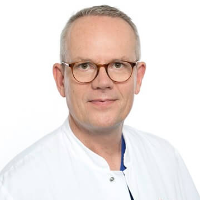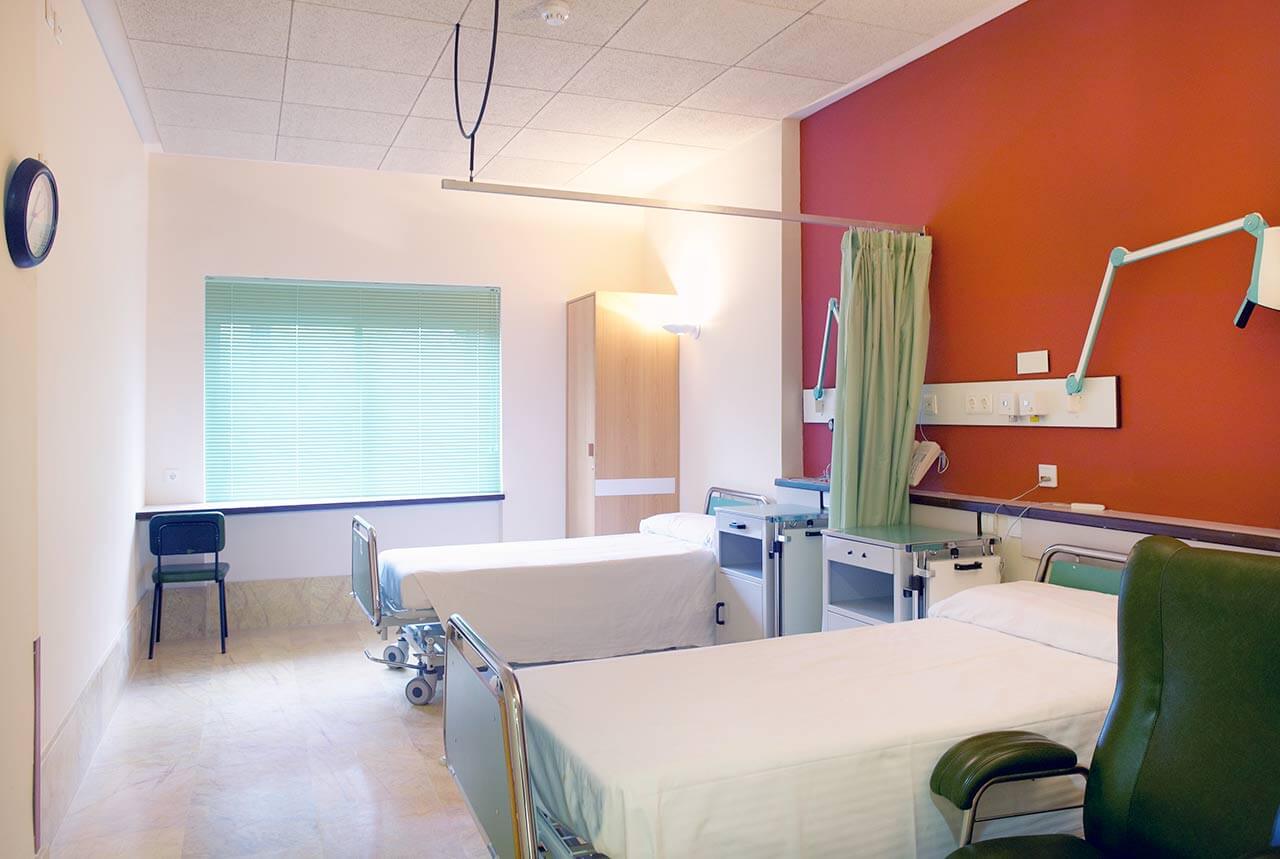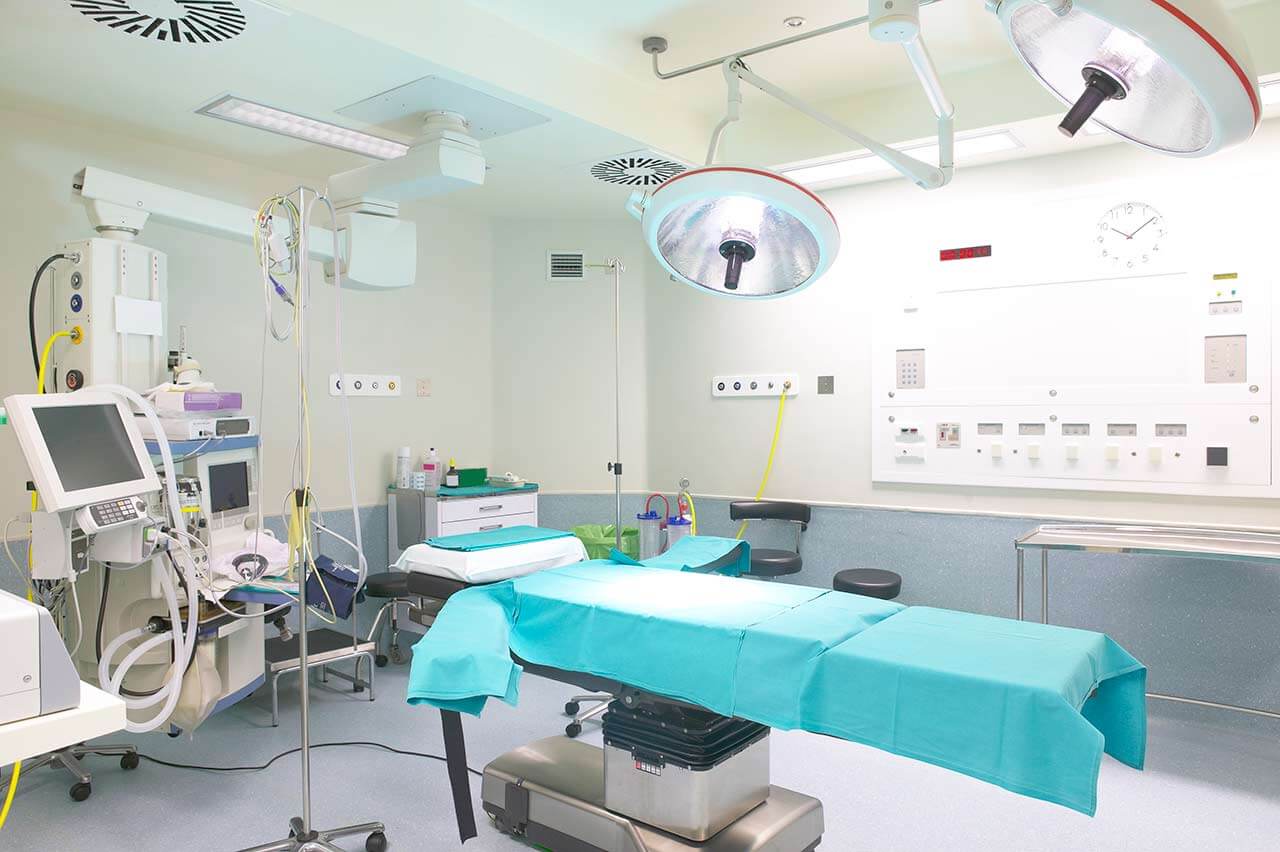
The program includes:
- Initial presentation in the clinic
- clinical history taking
- physical examination
- cardiological examination
- laboratory tests:
- complete blood count
- biochemical analysis of blood
- TSH-basal
- inflammation indicators
- indicators blood coagulation
- measurement of arterial blood pressure
- electrocardiogram
- Holter monitoring (24h)
- echocardiography
- transesophageal echocardiography
- preoperative care
- cardiac catheterization
- catheter procedure for treatment of ventricular
septal defect - symptomatic treatment
- control examinations
- the cost of essential medicines and materials
- nursing services
- full hospital accommodation
- explanation of future recommendations
Required documents
- Medical records
- Echocardiography (if available)
Service
You may also book:
 BookingHealth Price from:
BookingHealth Price from:
About the department
The Department of Cardiology, Angiology and Endocrinology at the Hospital Cologne-Merheim offers the full range of medical services for patients with heart, vascular, and endocrine diseases. In the field of cardiology, special attention is paid to interventional catheter-based procedures, treatment of heart rhythm disturbances (arrhythmias), emergency care for acute coronary syndrome, and cardiac imaging diagnostics. The department's angiologists have all the necessary resources for the diagnostics and treatment of arterial, venous, and lymphatic vessel diseases. The primary clinical focus of the department's endocrinologists is the treatment of type 1 and type 2 diabetes mellitus, as well as other types of diabetes mellitus and endocrinopathies. The department houses two state-of-the-art Cardiac Catheterization Laboratories where numerous effective diagnostic and therapeutic interventional procedures are performed. The department also widely uses drug therapy with pills, infusions, and injections. The medical team, consisting of 32 staff members, takes care of the health of patients. The specialists are always open to dialog with their patients, striving to take into account their individual needs and wishes. In 2021, a new building for the Section of Cardiology was put into operation. It is designed in accordance with the "Cardiology of the Future'' concept, which means that the very latest technologies and concepts of medical care for patients with heart disease are implemented here. The department is headed by Prof. Dr. med. Axel Meissner.
Special attention in the clinical practice of the department's cardiologists is paid to interventional diagnostic and therapeutic procedures with the use of catheter-based techniques. The specialists have two modern Cardiac Catheterization Laboratories with equipment for intravascular ultrasound scans, fractional flow reserve assessment, intravascular optical coherence tomography (OCT), right heart catheterization, and other tests. Cardiac Catheterization Laboratories are also adapted for performing therapeutic interventional procedures, which often serve as an alternative to traumatic surgery requiring a thoracotomy. The most popular heart interventional procedures include percutaneous transluminal coronary angioplasty followed by stent implantation for coronary stenosis and obstruction and closure of atrial septal defects, patent foramen ovale, and left atrial appendage using special occluders. The procedures are performed through a puncture in the femoral, subclavian, or ulnar artery with special miniature catheters under imaging guidance and local anesthesia.
The department's cardiologists also specialize in the diagnostics and treatment of heart rhythm disturbances (arrhythmias), such as tachycardia, bradycardia, atrial fibrillation, and paroxysmal supraventricular tachycardia. The hospital is certified as a Competence Center for Arrhythmias by the German Society of Cardiology (DGK). In many cases, normalizing the heart rhythm can be achieved with drug therapy, but in complex cases, catheter-based interventions such as the placement of pacemakers or implantable cardioverter-defibrillators may be required. The department also has vast experience in cardiac resynchronization therapy, which is indicated for patients with severe heart failure and bundle branch block.
The department's range of medical services is complemented by the diagnosis and treatment of diseases of the vascular system. Doctors provide medical care to patients with occlusive peripheral arterial disease, varicose veins, deep vein thrombosis, lymphoedema, and other pathologies. The department houses advanced diagnostic facilities where doctors perform Doppler ultrasonography, color duplex sonography, oscillography, venous occlusion plethysmography, light reflection rheography, capillary microscopy, percutaneous measurement of arterial blood oxygen saturation, and the placement of a device for 24-hour blood pressure monitoring. More than 7,500 angiography procedures are performed in the department every year. The department's specialists also provide conservative treatment for patients with vascular diseases. In complex cases, interventional radiologists and vascular surgeons may be involved in the therapeutic process. They cooperatively study clinical data and elaborate the most effective treatment regimen for the patient.
The medical facility also offers treatment for endocrine disorders. The primary focus for physicians is the management of patients with type 1 and type 2 diabetes mellitus. More than 1,000 inpatients with diabetes mellitus undergo treatment in the department annually, and about 700 patients with this disease from other departments of the hospital receive consultations here. Diabetes mellitus is an incurable disease, so the task of doctors is to compensate for the condition through diet, insulin, oral hypoglycemic medications, and physical activity. The department regularly organizes individual and group lifestyle modification training for patients with diabetes mellitus, enabling them to acquire the necessary knowledge for self-monitoring of the disease.
The department's therapeutic options include:
- Cardiology
- Drug therapy
- Interventional catheter-based procedures
- Percutaneous transluminal coronary angioplasty followed by stent implantation
- Rotablation
- Closure of atrial septal defect, patent foramen ovale, and left atrial appendage with occluders
- Placement of pacemakers and implantable cardioverter-defibrillators
- Cardiac resynchronization therapy
- Angiology
- Drug therapy
- Endovascular procedures (in collaboration with interventional radiologists)
- Endocrinology
- Drug therapy with oral hypoglycemic medications
- Insulin therapy, including insulin pumps
- Diet therapy
- Other medical services
Curriculum vitae
Since June 2011, Prof. Dr. med. Axel Meissner has been the Head Physician of the Department of Cardiology, Angiology and Endocrinology at the Hospital Cologne-Merheim. Prior to this, he worked at renowned Cardiology Centers in Bad Einhausen, Essen, and Bochum. Dr. med. Axel Meissner is board certified in Internal Medicine, Cardiology, and Intensive Care. The Professor is a Member of the European Society of Cardiology (ESC) and the European Heart Rhythm Association (EHRA).
Photo of the doctor: (c) Kliniken der Stadt Köln gGmbH
About hospital
According to the reputable Focus magazine, the Hospital Cologne-Merheim ranks among the top German medical centers!
The health facility is an academic hospital of Witten/Herdecke University, which gives patients access to the very latest developments in European medicine. The Hospital Cologne-Merheim positions itself as a maximum care medical center, which is why it offers a wide range of high-quality medical services. The hospital has 752 beds in 13 specialized departments. More than 28,000 inpatients are treated here every year. Outpatient care is also provided for many medical specialties. The hospital also collaborates closely with the University Hospital Cologne, carrying out fruitful work at the Transplant Center.
The most successful areas of clinical practice in the medical center are neurosurgery, pulmonology, transplantology, surgery (in particular, minimally invasive), cardiology, traumatology, joint replacement surgery, and plastic surgery. The Departments of Ophthalmology, Anesthesiology, Radiology, Neuroradiology, and Palliative Care are also distinguished by top-class medical service. In addition, the Departments of Neurology and Neurosurgery provide effective early rehabilitation programs for patients with stroke, traumatic brain injuries, brain tumors, and other neurological diseases. Comprehensive treatment of such a level is available only at highly specialized and best medical facilities in Germany.
The hospital has several ultramodern intensive care units, where patients in critical condition are treated.
It is worth noting that the hospital was the first in the region to be certified in accordance with KTQ® (Cooperation for Transparency and Quality in Health Care). The certification process is repeated every three years, and each time the hospital passes it with excellent results.
The basis for high-quality medical services lies in state-of-the-art equipment, the application of effective and reliable therapeutic methods, and the vast clinical experience and professionalism of doctors and nursing staff. The main value for each employee at the hospital is the patient's health. Doctors devote enough time to personal communication with patients in order to establish a trusting relationship and explain the details of upcoming treatment.
Photo: (с) depositphotos
Accommodation in hospital
Patients rooms
The patients of the Hospital Cologne-Merheim live in single and double rooms. All patient rooms are cozy and designed in light colors. Each patient room has an ensuite bathroom with a shower and a toilet. The furnishings of a standard patient room include an automatically adjustable bed, a bedside table with a pull-out tray, a wardrobe for personal belongings, a table and chairs for receiving visitors, a TV, and a telephone. Wi-Fi is also available in the patient rooms.
If desired, patients may stay in an enhanced-comfort room, which additionally provides a safe, a mini-fridge, and upholstered furniture.
Meals and Menus
The patients are offered three tasty and healthy meals a day: breakfast, lunch, and dinner. Breakfast and dinner are served as buffets, and for lunch, there is a set of three menus to choose from.
If, for some reason, you do not eat all the foods, you will be offered an individual menu. Please inform the medical staff about your dietary preferences prior to treatment.
Further details
Standard rooms include:
Religion
There is a chapel on the territory of the hospital, where Catholic and Evangelical worship is regularly held on Sundays and religious holidays. The chapel is also open daily for visits and solitude for prayers.
The services of representatives of other religions are available upon request.
Accompanying person
Your accompanying person may stay with you in your patient room or at the hotel of your choice during the inpatient program.
Hotel
You may stay at the hotel of your choice during the outpatient program. Our managers will support you for selecting the best option.




